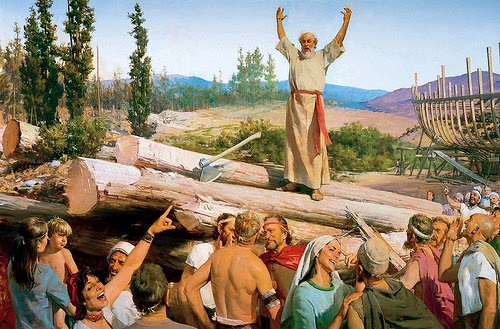
Stephen
Terry, Director

Matthew
24 and 25
Commentary
for the May 19, 2018 Sabbath School Lesson
 “As
it was in the days of Noah, so it will be at the coming of the Son of Man. For
in the days before the flood, people were eating and drinking, marrying and
giving in marriage, up to the day Noah entered the ark; and they knew nothing
about what would happen until the flood came and took them all away. That is
how it will be at the coming of the Son of Man.” Matthew 24:37-39, NIV
“As
it was in the days of Noah, so it will be at the coming of the Son of Man. For
in the days before the flood, people were eating and drinking, marrying and
giving in marriage, up to the day Noah entered the ark; and they knew nothing
about what would happen until the flood came and took them all away. That is
how it will be at the coming of the Son of Man.” Matthew 24:37-39, NIV
When I was a child growing up in the 1950s and 1960s, I
remember that I suffered a great deal of stress over world events. On the one
hand, science promised to unveil a wonderful new utopian future where many of
the menial functions of life would be swept into the dustbin of history as
robotic technology would soon take over everything from cleaning the floors to
transporting us to distant galaxies. These things fired up a young boy’s imagination,
and I was not alone if the popularity of the Star Trek science fiction franchise
is any indicator. Even today, Buzz Lightyear’s cry of “To infinity and beyond!”
strikes a resonating chord with many who have longed for decades for the
promise of science to bear its golden fruit. However, the stress came when we
all had to also live under the threat of imminent nuclear devastation, bringing
such dreams to ashes and threatening to dash all hope for humanity. All of us
try to find joy and promise in our futures, while the nuclear Sword of Damocles
dangles over our heads by the slimmest of threads. The dissonance this creates
pushes us either to total despair or denial of the reality of the threat.
Though individuals like Khrushchev, with his “We will bury you!” speech, come to
the fore from time to time to remind us that the threat is very real, some somehow
struggle on as though the threat did not exist. And so far, denial has gotten
us a long way. No massively destructive nuclear weapons have been used
offensively since Hiroshima and Nagasaki in World War II. No one knows if that
will continue to be the case, but it is very human to continue down a path that
seems to be working, no matter what the harbingers might say, until it no
longer does. Perhaps that is what happened in Noah’s day.
Jesus, in Matthew, chapter 24, makes a direct comparison
with events to come on the earth with the events and attitudes of Noah’s time. In
spite of the advance warning given through Noah and his preparation of the Ark
as a demonstration of his belief that the threat was real, people chose to
ignore the threat and go about life as normal. In spite of the overwhelming
evil of the times, most appear to have adapted to the situation and found it
more comforting to work within that system for whatever gain they might achieve
than to live in opposition to it. After all, when they looked around to their
friends and neighbors, they were all fine with it. The system had been
corrupted by the few at the top, but if one worked within the system, perhaps
they could achieve power also and then the system could be changed for the
better. But, then as now, instead of actually changing the system from within,
most found that the system changed them instead as they compromised away any
moralistic misgivings in order to gain that power they thought would allow them
to change thngs.
Noah, borne, as everyone else in his day, into that
corrupt world, decided at some point to walk away from the glittering promise
of power and control that world offered him. To put it on more modern terms, he
did not see an advantage of enslaving himself to others for much of his life in
order to pay for the supposed trappings of success. While his compatriots were pursuing
their careers with gusto and hoping to climb to the top of the corporate food
chain, his primary concern was to walk faithfully with God. As a result, his
family also followed him, trusting in that vision with the result that they
were saved from the danger to come. Because Noah was faithful, God spoke to him
to warn him of the coming flood, and Noah listened. We might question how Noah
could risk all on something that claimed to be the voice of God. After all,
there is no record that anyone other than Noah heard that warning, not even his
wife and children. It bears a striking parallel to God speaking to Abraham and
telling him to sacrifice his son, Isaac, on Mount Moriah.[i] How did these saints know
it was God and not some hallucinatory experience perhaps caused by some bad rye
tainted with ergot? The answer may be very simple. When a friend calls on the
phone to speak with you, they may not have to introduce themselves for the
reason that you know and recognize their voice. The more you have spoken with
them, the more likely that is the case. Perhaps this reveals a reason for the
necessity of an active prayer life, a necessity that even Jesus did not allow
to atrophy. As we communicate with God through prayer, we become accustomed to
wait upon His answers, and as we grow to understand the character of those replies,
we come to recognize the voice of God speaking into the world and into our
lives. As we become accustomed to the compassion and love in that voice, we
ardently seek it out, finding that the joys offered up by this world pale in
comparison.
Because there are many who claim to hear that voice when
they do not, it is important that we come to recognize it for ourselves. It
does not call us to prosper as this world prospers, for wealth saved no one in
Noah’s day, and it will save no one today. Wealth is no predictor of
righteousness or standing with God. Instead it will be swept away in the foretold
devastation no matter how hard we clutch it. That message is hammered home regularly
on the evening news. We see millions who lived in cities built by the wealth of
this world. Yet the cities are pounded into rubble and the denizens of those
metropolises flee with little more than the clothes on their backs. Even should
they manage to cling to some vestige of their former wealth, they are too often
robbed of what they possess at the peril of their lives while fleeing. Will
such a fate face us all? How should we prepare? Jesus’ answer was to pray.[ii] If we keep that
connection open, we will hear the guidance necessary to preserve us in the
troubling times to come. There is no promise of the same for our wealth.
In spite of the promise of a futuristic utopia built by technology
and science, time has taught us that along with the technology that has taken
computers that filled buildings and reduced them to smart phones capable of
fitting in our pockets, and in spite of the seeming limitless knowledge now available
to us at the sound of our voice or the touch of our fingers, we still struggle
to find peace or to have respect for one another. Instead it seems to have only
created an insatiable greed for more, and instead of engendering equality and
harmony, we too often see others as only a threat to our own climb to power and
control. Some might think this is only a secular affliction, but the church is
not immune. The church has also succumbed to power struggles where destroying
the careers of those who do not recognize that power is acceptable. We may
think we have come a long way since the days of the Spanish Inquisition under
Torquemada, but Torquemadas have only multiplied, posing
as leaders of righteousness but seeking to destroy anyone who challenges their power.
In order to concentrate that power, the church does as it has always done. It
portrays itself as the only reliable vehicle of grace. While it may pay lip
service to the idea that people might be saved outside its courts, in reality
it allows only for baptism into its control, and often marriage only within its
fellowship.
All of this was foretold by Jesus. Did we think that false
Christs would come from somewhere outside the church? Did we think that
atheists would betray us in the troubles to come? No, the false Christs will likely
be found where they can do the greatest damage, within the church,[iii] and betrayal is only
possible in the arms of those we consider friends. If we become used to
considering the voice of God to be the voice of the church, we may all the more
readily be deceived when that voice stops speaking like a lamb and begins to
speak like a dragon.[iv]
Perhaps we can be instructed by Christ’s example. Although He visited the
temple often, His relationship with His Father was not based on that. Instead it
was based on His study of the scriptures and His ongoing prayer life. Maybe if
we pursue that example, we can become familiar with the will of God as Jesus
was. That may be the only Ark able to save us when the time comes.
